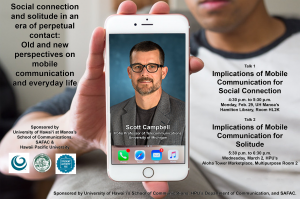Public lecture looks at both social connection and solitude in an era of mobile technologies
University of Hawaiʻi at MānoaScott Campbell, Pohs Professor of Telecommunications and Associate Professor of Communication Studies at the University of Michigan, will be a featured guest from February 29 through March 4 at Oʻahu university campuses, including two free public lectures at the UH Mānoa on February 29 and at Hawai‘i Pacific University (HPU) Aloha Tower Marketplace on March 2.
This lecture series, titled “Social connection and solitude in an era of perpetual contact: Old and new perspectives on mobile communication and everyday life,” is co-sponsored by the School of Communications in the UH Mānoa College of Social Sciences and HPU’s Department of Communication.
The first lecture will be held Monday, February 29, from 4:30 to 5:30 p.m. at Hamilton Library (2550 McCarthy Mall) in Room HL2K on the UH Mānoa campus. It will feature a short talk by Campbell called “Implications of mobile communication for social connection,” followed by a panel discussion of those ideas with Brett Oppegaard, assistant professor in the School of Communications at UH Mānoa, and guest scholar Sun Kyong (Sunny) Lee, assistant professor in the Department of Communication at the University of Oklahoma.
The second lecture, “Implications of mobile communication for solitude,” will be held Wednesday, March 2, from 5:30 to 6:30 p.m. at HPU’s Aloha Tower Marketplace (1 Aloha Tower Drive), Multipurpose Room 2. It will feature a longer lecture by Campbell that develops his ideas about mobile solitude and then integrates those with ideas about connection.
With the evolution of the traditional analog “cell phone” into a digital platform, mobile communication has become the fastest diffusing communication technology in history. Along with its rise to critical mass, and ultimately saturation, a growing body of research and theory has developed to identify and explain the social implications of mobile communication.
This two-part series of talks will engage with research and theory in the field of mobile communication studies to address questions about how (and how much) people are socially connected through the technology as well as implications for the other side of the perspective: solitude. These two talks will be highly complementary yet also distinct. While attendance at both is encouraged, they also are stand-alone programs, designed to be accessible and approachable for diverse public audiences.
Besides the large central themes, Campbell also will engage with a number of questions pertaining to mobile communication and everyday life, such as:
- What’s the difference between mobile and portable . . . and does it really matter?
- Does mobile communication lead to insular “tele-cocoons” of core ties, or does it expand the range of social contacts?
- Why do people still text and drive when they know it is dangerous?
- Why do people experience “phantom vibrations” and what do they mean?
Campbell’s work on mobile communication matters has been published in the Journal of Communication, Human Communication Research, Communication Monographs, Communication Research, New Media & Society, Mobile Media & Communication, and other scholarly publications. He has co-edited two books (with Rich Ling) for the Mobile Communication Research Series and collaborated with the Pew Internet & American Life Project on a national study of teens and mobile communication. Campbell also currently has a book under contract with Oxford University Press that centrally engages with the issues in these talks.
Before joining Michigan, Dr. Campbell spent three years on faculty at Hawaiʻi Pacific University on Oʻahu. Prior to his academic life, he worked for Sprint PCS, where he helped launch the first national digital mobile network in the United States.
Both public lectures are free and open to the public. The series is sponsored by the School of Communications in the UH Mānoa College of Social Sciences and HPU’s Department of Communication, and HPU Student Activities Fees Committee.
The School of Communications in the College of Social Sciences at the University of Hawai‘i at Mānoa offers academic programs in Communication and Journalism. Communication focuses on communication in intercultural and professional communities, information and communication technologies (ICTs) and policy, and the media arts. Journalism is professionally oriented and develops critical thinking skills and ability to gather, analyze, and organize information, and to communicate it clearly and responsibly through print, broadcast, and online media.
The College of Social Sciences (CSS) at the University of Hawai‘i at Mānoa is engaged in a broad range of research endeavors that address fundamental questions about human behavior and the workings of local, national and international political, social, economic and cultural institutions. Its vibrant student-centered academic climate supports outstanding scholarship through internships, and active and service learning approaches to teaching that prepare students for the life-long pursuit of knowledge.
The Department of Communication at Hawaiʻi Pacific University offers bachelor’s degrees in Communication Studies, Integrated Multimedia, Multimedia Cinematic Production, and Mass Communication as well as a master’s degree in Communication.

